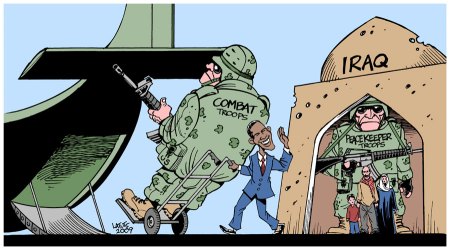
What troop withdrawal? The U.S. isn’t withdrawing from Iraq — it’s only pinning a new label on the occupation.
Last week, amid much media hoopla, the withdrawal of “the last combat brigade” in Iraq was staged. Barack Obama announced that by Aug. 31, 2010, “America’s combat mission” in Iraq would end, and the U.S. mission would change from combat to “support and training” of the Iraqi security forces. He also said that by the end of 2011, all remaining troops would be withdrawn from the country. Most media sources announced this in their headlines, calling it the de facto end of the war in Iraq. That assessment had nothing at all to do with reality. In fact, the occupation was merely given a new name and a different organizational chart to ensure its future survival.
As of September, about 50,000 U.S. soldiers will still be in Iraq as “training and support” personnel for the Iraqi army. That’s double the number of troops that were serving in Afghanistan at the time of Obama’s inauguration. Back in Iraq, heavily armed Army brigades along with Air Force units will remain and continue to do that which they’ve been doing for seven years: namely, go after the political enemies of the United States and their allies, taking them prisoner or killing them. These combat operations will by no means end; they’ll just be called “stabilization operations” in the future.
U.S. Vice President Joe Biden has assured all those critics who consider the withdrawal to be premature that the majority of remaining troops “will still be guys who can shoot straight and go get bad guys.” When asked, Defense Secretary Robert Gates also confirmed that the troops, independent of the non-combat designation, will still be engaged in “targeted counterterrorism operations.” Thomas Ricks, military expert for the Washington Post, groused, “There is no pacifistic branch of the U.S. military. … There is no such thing as non-combat troops.”
The troop-stationing agreement with Iraq signed during the Bush administration forbids any combat action without permission of the Iraqi government. Explicitly excluded from this clause are instances of self-defense. The U.S. military has therefore declared most of its operations primarily defensive in nature — the army operates, as it were, in a putative, constant, self-defensive posture.
One of the main duties of the remaining troops is the ongoing training of Iraqi security forces. Over the past seven years, however, hundreds of thousands of Iraqis have gone through this training, so there can be no great lack of military know-how. The reality is that the training is designed to build up and directly control a force loyal to the United States. Thus far, they haven’t had a great deal of success. Nominally, the Iraqi security force, including various militias controlled by the government, encompasses about 660,000 troops. The loyalty and esprit de corps among them are considered extremely questionable by the Americans, and the new army lacks the high-tech weaponry that allows the occupation forces to stand up to the enemy.
According to estimates by U.S. commanding generals, U.S. troops will need to maintain a presence in Iraq for many years to come in order to secure the country. That’s why they made it clear from the beginning that they don’t consider the stationing agreement to be binding. Army Chief of Staff George W. Casey Jr. recently explained that his plans for the Army in Iraq include combat troops as far out as ten years hence.
Combat against the enemy is but one aspect of the U.S.-led effort. A total withdrawal would not only mean a quick end to the ambitious plans for the oil-rich nation, it would also leave the field open to Iran, which has in any case become the strongest force in the Middle East since Iraq’s defeat.
No one in Iraq seriously believes the United States will leave of its own free will. Most experts also believe that, at a minimum, the U.S. will permanently retain the five military mega-installations it constructed there. Defense Secretary Gates has already announced that the U.S. is considering negotiating an extension to the troop-stationing agreement with Baghdad. This, according to calculations, would make it obvious to the Iraqis that they wouldn’t survive for very long without the presence of the U.S. military.
Additionally, a suitable new government would first have to be formed. The difficulties encountered since March in just trying to form a cabinet aren’t solely due to internal Iraqi rivalries, but also to the fact that the occupying forces are determined to exclude radical opponents of the occupation from any governing coalition. Washington is pushing for a coalition between Nouri al-Maliki and election winner Ayad Allawi — a coalition where al-Maliki would remain head of state, but Allawi would occupy the newly created position of national security chief, a position that would grant him significant power. Such a coalition of pro-American heavyweights would be able to control the influence not only of the more radical nationalist factions of Allawi’s coalition, Al-Iraqiya, but also rein in the pro-Iranian Shiite alliance, especially the movement led by Muqtada al-Sadr that has a good deal of power in parliament.
A discussion of extending the U.S. troop presence in Iraq isn’t opportune at the moment. In Baghdad, at least, none of the aspirants to the office of prime minister would currently risk publicly supporting such an extension.

Leave a Reply
You must be logged in to post a comment.